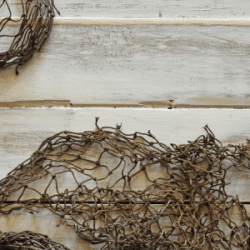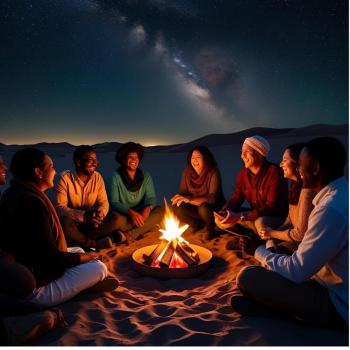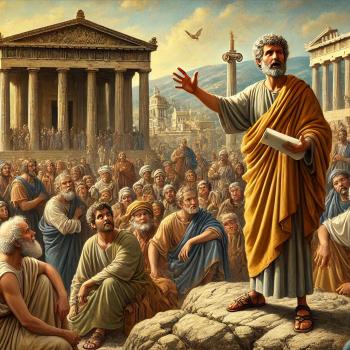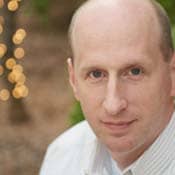It was morning, but still dark as the soldier finished writing. His hands shook, and he had a hard time feeling his fingers -- not from the cold but from fear. He was standing in line -- a very long, blue line, soldiers standing shoulder to shoulder -- and he wrote quickly.
A mist hung over the darkened field. The day's first light had started to glow on the horizon. He was aware of everything -- the chirping birds in the trees, the slight rustle of the morning wind, the breathing and coughing of the men around him. He felt so very aware. So very alive.
The eastern sky turned orange. Although it was dawn, it was already warm. As the sky brightened, he thought he could make out the long gray line across the great field in front of him.
There it was. The bugle call. He willed his feet forward, but for an instant they wouldn't move, so heavy was the weight of his fear. His eyes darted left and right. His brothers didn't hesitate, so he took a big first step to even the line. Left. Right. Left.
Concentrate on the steps.
Out of the corner of his eyes, he saw the union flag. Ahead, in the distance, the red flags of rebellion, and beneath them the glint of bayonets. So many bayonets. Fifty thousand, his lieutenant said.
Concentrate on the steps.
He looked straight ahead and felt the sting of tears in his eyes. Too much emotion. Now he could barely feel his arms.
Concentrate on the steps.
He saw the cannons flash before he heard the boom. Then the screams. He never got used to the screams. The line bent but didn't break. Fill the holes! They kept walking. More cannon. More screams. Then the forest of bayonets disappeared. You can't see a bayonet when the rifle points at you. Then thousands of gunpowder flashes at once. He had a tenth of a second more to think of his life.
Concentrate on the steps.
Then it was over.
Four days later, the burial parties ventured into no-man's land. They found the soldier torn to pieces. They opened his pack -- looking for the final letters that so many soldiers wrote. Instead they found a diary.
They flipped through to the last entry. "June 3, 1864. Cold Harbor. I was killed."
Cold Harbor was a slaughter. In less than one hour, 7,000 Union troops fell. The union soldiers, veterans of a campaign that had already cost more than 50,000 casualties in a matter of weeks, knew their lives were likely over. They knew the folly of what they were asked to do. Yet they surged forward anyway. They took up their cross, did their duty, and died. Lee did not budge. Grant -- though he later regretted the attack -- stayed the course, the war ground on for almost another full year, and Cold Harbor passed into history, forgotten in the midst of a conflict that caused human suffering a scale not seen in our nation before or since.
On Thanksgiving Day, to the extent we think about history, we think about Pilgrims and Indians. But we forget how Thanksgiving passed from tradition to holiday. It was Abraham Lincoln, writing a proclamation on October 3, 1863:
I do therefore invite my fellow citizens in every part of the United States, and also those who are at sea and those who are sojourning in foreign lands, to set apart and observe the last Thursday of November next, as a day of Thanksgiving and Praise to our beneficent Father who dwelleth in the Heavens. And I recommend to them that while offering up the ascriptions justly due to Him for such singular deliverances and blessings, they do also, with humble penitence for our national perverseness and disobedience, commend to His tender care all those who have become widows, orphans, mourners or sufferers in the lamentable civil strife in which we are unavoidably engaged, and fervently implore the interposition of the Almighty Hand to heal the wounds of the nation and to restore it as soon as may be consistent with the Divine purposes to the full enjoyment of peace, harmony, tranquility and Union.
It seems strange to celebrate Thanksgiving in the midst of slaughter, but in a profound way, our nation had never known more reason to give thanks -- because of men like the unnamed soldier who fell on June 3, 1864. One should give thanks for indescribable courage.
On this day, in foreign fields, we face individual Cold Harbors, as men die in ones and twos, alone and far from home. At home we face Cold Harbors of the soul, as we confront the insurmountable challenges in our lives -- illnesses, fracturing relationships, financial despair. And yet still our nation produces men and women who do not waver. Men and women who hold the line -- abroad and at home. They press on, taking up their crosses as their Savior took up His.
It is for those people that I am thankful. It is for those who aren't asking for the "best life" but instead for the courage to do their duty, for the will to take that one extra step, and for the fidelity to answer the sometimes daunting call of a God who gives eternal hope even as the enemy takes their earthly life.
11/22/2010 5:00:00 AM





